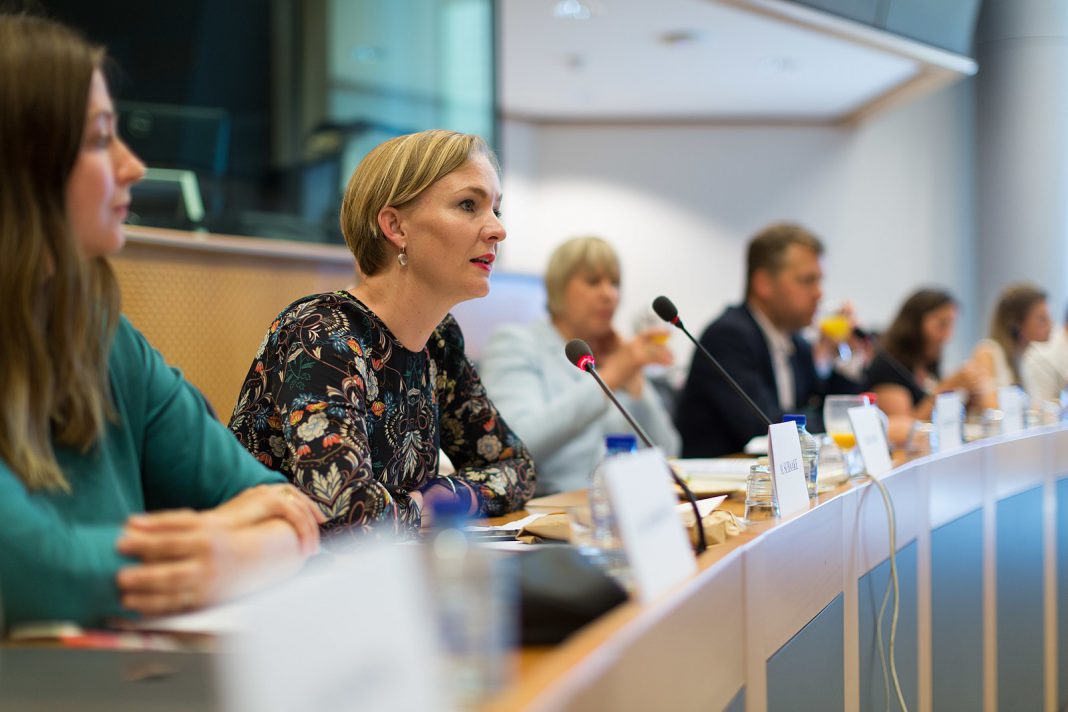Marietje Schaake, a member of the European Parliament from the Netherlands and part of the Alliance of Liberals and Democrats for Europe Party (ALDE), on Wednesday sent a letter to Turkish President Recep Tayyip Erdoğan cosigned by 34 MEPs from across the political spectrum urging him to improve the protection of fundamental rights and freedoms following the termination of a two-year-long state of emergency in Turkey.
The state of emergency was formally ended on Thursday, amid the introduction of a bill proposing new anti-terror laws by the ruling Justice and Development Party (AKP) government led by President Erdoğan that envisages boosting the powers of Turkish authorities in detaining suspects, imposing security measures that even fall outside the state of emergency and proposing to keep some state of emergency measures in effect for three more years.
The new laws have been criticized as a permanent extension of the state of emergency by opposition lawmakers.
Noting that while the signatories welcome the end of the state of emergency, Schaake said that “there are reasons to remain concerned as the government can still prevent the full enjoyment of those rights by presidential decree even after the state of emergency is lifted.”
The state of emergency was declared in Turkey on July 20, 2016 by the AKP government in the aftermath of a failed coup attempt on July 15, 2016. It was extended seven times, the last time being in April.
Erdoğan and his government were granted extraordinary powers by the state of emergency. Under it, the government pressed ahead with many controversial decrees that had the force of law and were not required to be approved by Parliament. In line with these decrees, more than 150,000 people were purged from state bodies on coup charges.
The lawmakers’ letter urges the Turkish government to improve the protection of fundamental rights and freedoms and also makes reference to several unresolved human rights issues such as the arrest of Osman Kavala and Selahattin Demirtaş, as well as the blockage of Wikipedia in Turkey.
The full text of the letter is as follows:
Brussels, July 18th 2018
His Excellency Recep Tayyip Erdogan,
We urge your Government to ensure the protection of fundamental human rights and freedoms. We therefore welcome the expected end of the state of emergency, which for the past two years has meant certain rights guaranteed by the European Convention of Human Rights were suspended. Yet we are concerned that even after the state of emergency is lifted, Presidential decree will allow the suspension of rights.
In general, we are alarmed by what the European Commission has called “serious backsliding” on human rights. In a decree issued earlier this month, you ordered more than 18,000 civil servants be fired. This number is added to the 130,000 people already fired from government jobs.
Furthermore, thousands of people have been illegitimately detained, including human rights defenders, writers, and social media users.
The withdrawal of press cards, as well as the closure of numerous media outlets or the assertion of government control remain deeply troubling and are incompatible with Turkey’s commitments to human rights and freedoms.
The Government continues to use its authorities to block online content on a wide range of grounds. The global encyclopedia Wikipedia remains blocked in Turkey for more than a year, denying people access to information on topics ranging from medicine, to history, to current events.
As President, we look to you to take immediate and irreversible steps to demonstrate a commitment to people’s rights under this new government.
We call for the release of all unjustly detained, and for an end to censorship and silencing of journalists.
In particular, the immediate release of Osman Kavala and Selehattin Demirtas would help indicate that there is commitment to international standards concerning freedom of expression and fair trial.
Sincerely,
Marietje Schaake (ALDE)
Rebecca Harms (Greens/EFA)
Anna Maria Corazza Bildt (EPP)
Alessia Mosca (S&D)
Bodil Valero (Greens/EFA)
Matthijs van Miltenburg (ALDE)
Joachim Starbatty (ECR)
Bernd Kölmel (ECR)
Helmut Scholz (GUE/NGL)
Renate Sommer (EPP)
Sven Giegold (Greens/EFA)
Jean Lamberts (Greens/EFA)
Brando Benifei (S&D)
Marie-Christine Vergiat (GUE/NGL)
Jiří Pospíšil (EPP)
Hans-Olaf Henkel (ECR)
Michal Boni (EPP)
Julie Ward (S&D)
Pavel Telicka (ALDE)
Sophie in ‘t Veld (ALDE)
Ana Gomes (S&D)
Franz Obermayr (ENF)
Margot Parker (EFDD)
Kostas Chrysogonos (GUE/NGL)
Jordi Solé (Greens/EFA)
Tunne Kelam (EPP)
Takis Hadjigeorgiou (GUE/NGL)
Eleonora Forenza (GUE/NGL)
William Dartmouth (EFDD)
Helga Trüpel (Greens/EFA)
Helga Stevens (ECR)
Cornelia Ernst (GUE/NGL)
Hilde Vautmans (ALDE)
Eva Kaili (S&D)
Barbara Spinelli (GUE/NGL)



